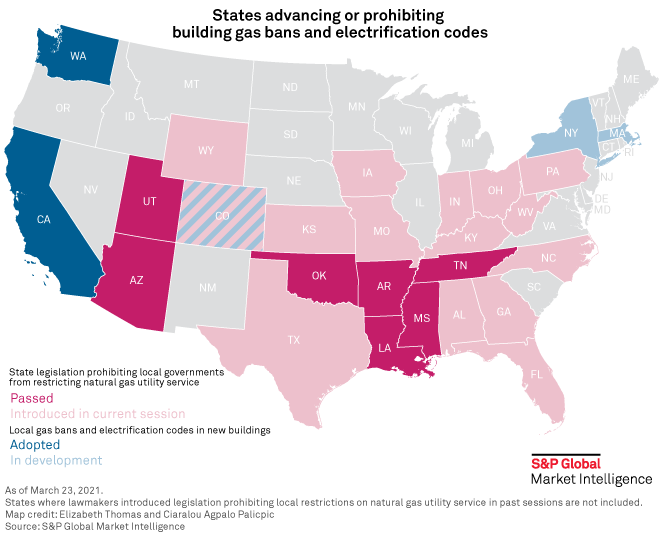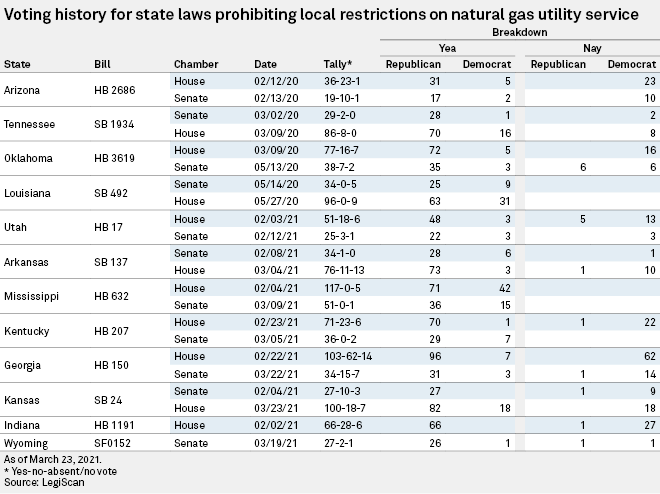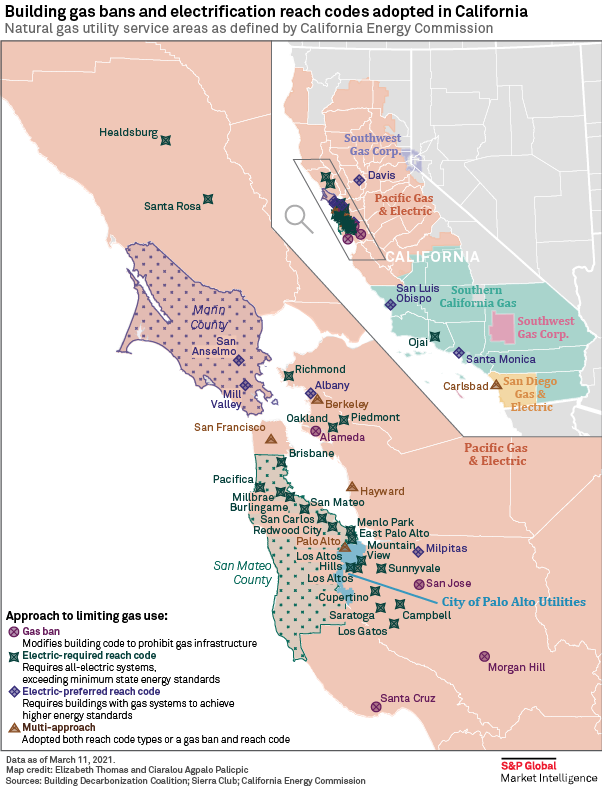S&P Global Offerings
Featured Topics
Featured Products
Events
S&P Global Offerings
Featured Topics
Featured Products
Events
S&P Global Offerings
Featured Topics
Featured Products
Events
Banking & Capital Markets
Economy & Finance
Energy Transition & Sustainability
Technology & Innovation
Podcasts & Newsletters
Banking & Capital Markets
Economy & Finance
Energy Transition & Sustainability
Technology & Innovation
Podcasts & Newsletters
S&P Global Offerings
Featured Topics
Featured Products
Events
25 Mar, 2021
Utah, Arkansas and Mississippi joined four other states in prohibiting local governments from restricting natural gas use in buildings as similar bills advanced in at least 14 more states and stalled in Colorado. The pace of new building gas bans in California slowed, though one of two new all-electric construction ordinances seeks to restrict gas use not just in new construction but also in existing buildings.
Utah crosses finish line first in 2021
Utah became the first state in the current legislative session to pass a law blocking cities, towns and counties from passing California-style building gas bans and all-electric construction requirements. Of the seven states that have adopted the policy, Utah is the only one where an electrification effort is underway in a major city.
House Bill 17 sailed through the Utah Legislature's lower chamber in a mostly party-line vote Feb. 3. It passed in the Senate on Feb. 12, splitting the chamber's six Democrats and garnering support from all voting Republicans. Gov. Spencer Cox signed the act into law Feb. 25.

The law prohibits municipalities and counties from enacting "an ordinance, a resolution, or a policy that prohibits, or has the effect of prohibiting, the connection or reconnection of an energy utility service." It does not block local or county officials from supporting electrification through incentives or restricting gas use in municipal or county buildings.
Since 2019, Salt Lake City has worked with the Building Electrification Institute, or BEI, to assess the city's potential for electric heat pump adoption. However, the BEI and stakeholders were not pursuing a ban on gas use in new buildings. Instead, they have been considering a more moderate step: requiring new buildings with gas hookups to be wired for electric heating and appliances, making it easier for Salt Lakers to go all-electric.
HB 17 would not appear to disrupt that pursuit because Salt Lake City would seek to include the requirement in Utah's next energy code update, which must be approved by state lawmakers, according to Tyler Poulson, deputy director at the BEI.
"Salt Lake City never harbored any kind of expectations that it could do a Berkeley-style ban or that it could influence code on a local level," Poulson said. "The city never intended to take action unilaterally. It was always the vision, just understanding the politics and where decisions are made on this, to collaborate and ultimately have that conversation at the state level."
The state's only regulated public gas utility is Dominion Energy Inc., which distributes gas to roughly 90% of Utah households, according to the Utah Department of Commerce. The state is home to Dominion's first renewable natural gas project through its Align RNG partnership as well as a pilot project to blend hydrogen into the gas grid.
Lawmakers in nearly half of US states aim to block gas bans
Since Jan. 27, at least 10 states have introduced similar legislation: Alabama, Colorado, Florida, Georgia, Iowa, North Carolina, Ohio, Pennsylvania, West Virginia and Wyoming. At least 22 states have now adopted or introduced bills that would prohibit building gas bans.
On March 10, Arkansas followed Utah in adopting the policy when Senate Bill 137 became an act. It drew just one opposing vote from a Democrat in the Republican-dominated Senate, though most House Democrats either opposed the bill or did not vote. The act would extend protection to Black Hills Corp. and CenterPoint Energy Inc.

On March 17, Mississippi Gov. Tate Reeves signed the All Fuels Act of 2021 into law. Introduced as House Bill 632, the legislation passed both chambers of the Mississippi Legislature with unanimous bipartisan support from all voting lawmakers. It protects growth prospects for Atmos Energy Corp., CenterPoint and Spire Inc.
Laws have passed both chambers of the state legislatures in Kansas, Kentucky and Georgia, while Indiana and Wyoming have passed legislation in one chamber. A Georgia law stands to preserve growth potential for Algonquin Power & Utilities Corp. subsidiary Liberty Utilities Co. and The Southern Co. utility Atlanta Gas Light Co., while the Kentucky bill would do the same for Atmos, Duke Energy Kentucky Inc., Essential Utilities Inc. subsidiary Delta Natural Gas Co. Inc., NiSource Inc. subsidiary Columbia Gas of Kentucky Inc., and PPL Corp. subsidiary Louisville Gas and Electric Co.
All of the votes have taken place in Republican-controlled legislatures, with 10 either generating bipartisan support or evenly splitting the vote among Democrats. A majority of Democrats voted in opposition in 12 votes.
Among the 22 states, the only one where the legislature is controlled by Democrats, Colorado, quickly killed the legislation. All seven voting Democrats on the House Energy and Environment Committee voted March 3 to indefinitely suspend the bill introduced by Weld County Republican Dan Woog. The committee's five Republicans voted against the move.
This comes as Denver is developing a building code to reduce gas use in future update cycles and as Boulder, Colo., has established building standards that could make it difficult for developers to include gas infrastructure.
California gas ban count surpasses 40
The Piedmont City Council in California adopted a building electrification ordinance Feb. 1 that tackles new and existing homes, roughly six months after lawmakers sent the legislation back to city staff over concerns about cost, clarity and support among residents.
The ordinance mandates all-electric construction of new low-rise residential buildings in the affluent community outside of Oakland. It also requires homeowners to choose from a list of energy efficiency or electrification interventions during substantial renovations and to install solar panels as part of large additions. Lastly, it requires kitchen and laundry area renovations and electric panel upgrades to include wiring to accommodate electric appliances.

The final ordinance included an exemption to accommodate Piedmonters who have already taken energy efficiency measures. Any residence awarded a Home Energy Score of 7 out of 10 within the last five years, using U.S. Energy Department criteria, would not have to add an energy efficiency or electrification intervention to the renovation. Staff also clarified the process for obtaining an exemption and appealing a decision and listed nonstructural projects that would not trigger a renovation requirement.
After conducting a new survey, staff found that two-thirds of residents supported reducing natural gas use through the building code update, even after considering added costs and concerns from community members.
On Feb. 22, the city council in San Carlos, Calif., adopted an ordinance requiring all-electric construction in new buildings and substantial rebuilds. The ordinance originally included a blanket exemption for gas stoves and fireplaces in homes, but lawmakers opted to require electric appliances in multi-unit residential buildings, leaving the exception open only to single-family homes and small residences.
The ordinance included exemptions for labs and commercial kitchens and in spaces for which the California Energy Code does not provide a compliance pathway or where electrification is not viable. In each case, the exemption requires the applicant to make a case for exemption and obtain approval.
